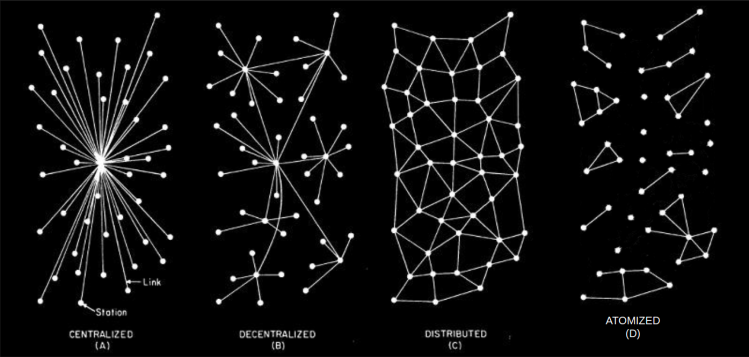
The Revolution Will Not Be Centralized: The Case for Pods
As a fragmented society exploited by centralized institutions, decentralized solidarity networks are integral to the evolution of civil…
If you have followed our media or been to one of our neighborhood pod workshops, you might be asking, "Why neighborhood pods though?" Why not appeal to institutions like police, electoral parties, non-profits, and corporations? Or better yet, why not start our own versions of these and compete with them? Isn’t that a more long-term solution?
What these approaches all have in common is the assumption that our problems are best solved in ways resembling graphic A - centralized, with a leader or organization right in the middle of it all. In practice, centralization increases the power that can be wielded by a single person or group. We’ve seen how this functions, both in normal operations and in times of crisis. We’ve seen the limits of its potential and the dangers of its perpetuation.
But what about our communities? For most of us, they’re a lot like graphic D - atomized individuals, couples and small families, sometimes clumped into interest groups and subcultures, but fundamentally disconnected from each other. Like centralization, we’ve seen the limits of its potential and the dangers of its perpetuation.
In any mature, resilient system in nature, we find decentralized networks with lots of localized, self-directed activity, where each component has many relationships. In these systems, there is no single point of failure, no one place to target an attack. These systems fall somewhere between graphics B and C. If you look at B, the nodes that fan out with many connections are the point people, connecting the members of their neighborhood into the greater network of the confederated system. This is what a young neighborhood pod looks like - one or two motivated people reaching out to their block and helping them to connect to each other. Over time, connections form organically between the other members, due to proximity and the natural tendency to socialize when that socialization is actually rewarding. Without this cohesion and solidarity, all the shuffling and fragmenting of our society will continue, and the domination of those fragmented individuals and small groups by large, centralized institutions will continue. Hand in hand together, built on a foundation of mutual respect and consent, we can be stronger than all of this.
Decentralizing can be hard. People have a tendency to fear what they can’t control, but ask yourself, if you were a bad actor, which of these systems would you prefer? In a crisis, what happens to all those isolated, solitary dots? What sort of power do centralized, nonconsensual institutions hold over our lives? Decentralization is integral to our evolution as a society. Without decentralized solidarity networks on the ground, we will always be fighting uphill battles when it comes to food, housing, and all of the other problems that persist in our fragmented and dominated society.
For a helpful guide to building decentralized power in your neighborhood, see the video below.